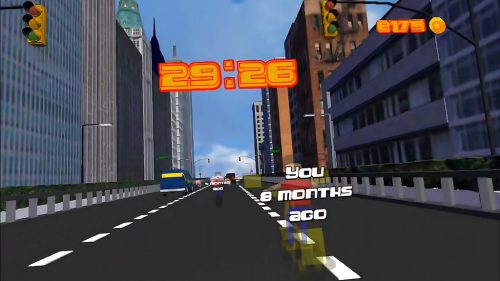Home-based cycling game developed at University of Bath launches on Meta Quest Store

A home-based cycling game developed at the University of Bath has launched on the Meta Quest Store.
Race Yourselves! – an indoor cycling game that leverages artificial intelligence and virtual reality technology – has been developed by computer scientists at the university’s REVEAL centre and can be played for free, with a premium version priced at £4.99.
It can work using any VR headset and any static bike (or a road bike converted into a static bike with a trainer stand). The game pits racers against multiple ‘ghosts’ of themselves. A ghost is an avatar representing a player’s performance from an earlier race. During a race, these ghosts surround the active player and are labelled with the date of the performance they represent.
It builds on research by the REVEAL team that racing against yourself is far more motivating than indoor cycling alone or racing against anonymous strangers.
Most digital and VR exercise apps rely on Bluetooth to connect a user to their device. By contrast, Race Yourselves! uses sensors in the VR headset to track a cyclist’s head movements as they navigate a dynamic virtual landscape. As a player tilts their heads left and right to avoid obstacles and collect rewards, the game’s algorithm deciphers these subtle movements to gauge pedalling speed.
Dr Christof Lutteroth, who led the research, said: “Most static bikes rely on Bluetooth for riders to access training programs and track their progress, and often bike brands work exclusively with their own fitness apps, meaning riders are locked into a single hardware brand and are forced to pay a rolling subscription for this brand’s software. With Race Yourselves! a player is free to buy a cheap static bike from a high-street department store and download the game onto any VR headset.”
During its launch period, the game will be available exclusively through the Meta Quest Store and must be played with a Meta Quest headset, costing from £290.
“Meta Quest headsets are not the cheapest headsets on the market, but they are good value for money,” said Dr Lutteroth.
The team is actively developing a mobile version of the game, due to be released in the near future.
In research published in 2020, the team behind Race Yourselves! discovered that static bike users get fit twice as fast when they race against multiple versions of themselves rather than pedalling alone or against anonymous strangers. This discovery motivated the researchers to transform their concept game into a marketable product, resulting in the game available for download today.
Dr. Lutteroth said: “Who is your best opponent – that is, the person who will push you for just the right amount of time and to just the right degree? You are! Racing against your own ghosts is motivating for everyone – top athletes and people who are less fit or competitive. When you race against versions of yourself from yesterday, last week, last month or last year, you have a realistic chance of winning, which inspires you to try harder and helps you avoid the stigma of losing.”
Next, the team plans to develop a game platform that will allow people to race against others playing remotely.
Dr Lutteroth said: “Many e-racing platforms have created vibrant networks where participants can compete, exchange advice and encourage one another, and this is what we will be building, too. These platforms allow users to see their real-time rankings against others, adding an exciting competitive element.”
The researchers also plan to add virtual coaching to the app, where AI-powered virtual coaches will guide a player through cycling drills, offering tips and encouragement in much the way a human trainer would.
Virtual coaches will use AI-powered emotional intelligence, operated through special wrist bands, to gauge the psychological state of a player and determine their readiness to push harder or ease off in their exercise.
Dr Lutteroth said: “Through the wrist band, the AI will figure out in real time how a person is feeling – overwhelmed and frustrated or motivated and ready for more. The coach will then adjust the game to keep the exercise session fun and motivating.”
The REVEAL team is currently refining emotional intelligence AI and expects to integrate it into the game over the next 10 months.
The researchers are also exploring the possibility of creating a version of the game that can be played by groups of cyclists of all levels in gym-based spin classes.









